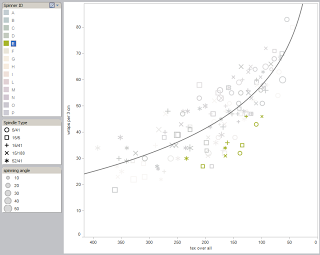I was asked recently about my electricity needs for my market stall - for lighting in the evening hours. My electricity needs are described in a single word: None.
I have a very easy policy for late-night market hours. Evening or even night market hours are a phenomenon that seems to become quite common these days on events, especially on events connected to a town anniversary festival.
My policy is that when dusk comes upon the market area, I am slowly packing up the small stuff, and when dusk is fully come, I close my shop. Nobody is going to see anything in my market stall anyways in the dark hours, except if I install a floodlight contraption (which will not fit into my tiny little TGV and aside from this is not really historical). There's just no sense to shop for plant-dyed threads in the darkness, and there's no way anyone will be able to appreciate the gossamer-fine hairnets and the delicately manufactured needles and needle-cases in the evening hours.
And my shop is not the only one thus affected - which is why evening- and night-hour markets are one of my (albeit lighter) pet peeves. Would you shop for something at night? When you can't discern its details, or properly search for flaws? I cannot believe that back in the Middle Ages somebody would have shopped for something in the evening hours unless driven by dire need. And in all the years that I visited markets, I have never bought anything after dusk (except food or drink, of course). I have looked around and chatted with people, and I have said things like "oh, that's where his/her stall is, I'll have to come back tomorrow and have a look".
I can just see no reason at all to shop at night, and I think that it doesn't fit in with a "historical market" scheme. A few oil-lamps or lanterns are nice and add to the atmosphere, but will never give off enough light to properly shop by. With lighting by oil lamps or lanterns also come the problems with fuel spills and other, flame-related, hazards. Thus, a lot of the late-hour stalls have electrical light installed. That is more or less hidden and more or less made to look like lantern light, but it is still electrical lighting and thus out of place in an otherwise historical stall. I refuse to buy something under electrical lighting in both cases: When it looks like lantern-light (because then it's too dark for my taste to see and properly appreciate the wares) and when it looks like a floodlight installation gone astray (because this just glaringly stands out of the historical setting so much it hurts).
I'm fine with food and drinks stalls, I like to sit somewhere and see people walk by, or perform something, or listen to some musician on the square and have a little chat with friends. And I can understand if incense or lanterns are sold after dark. But all the rest? Even if it is a merchant or craftsperson I know and trust, I want to see the things I'm about to buy in daylight to fully appreciate them. So why do we need to transfer our modern late shopping hours to a historical market anyway? Is it our modern taste for convenience? Is there anybody really shopping at night, spending money enough to make it worth opening shop for so long? Or do the merchants just stand around and look decoratively with their stalls open and lit?





